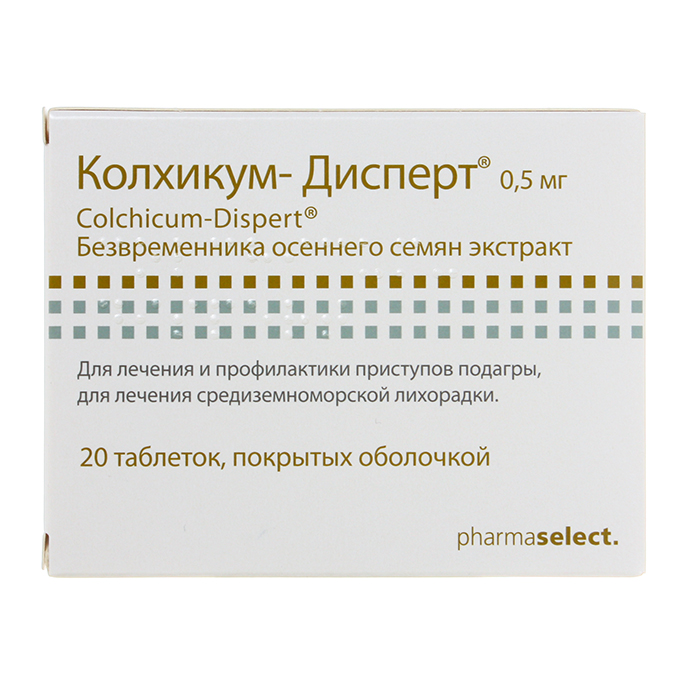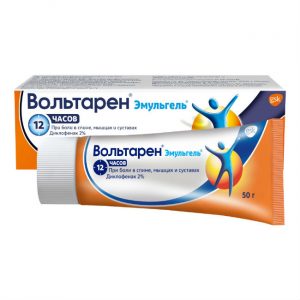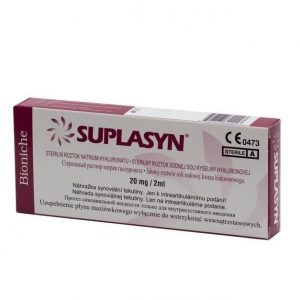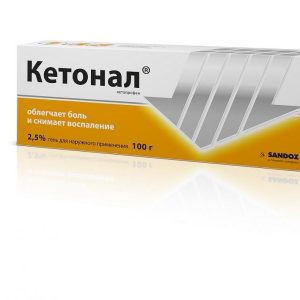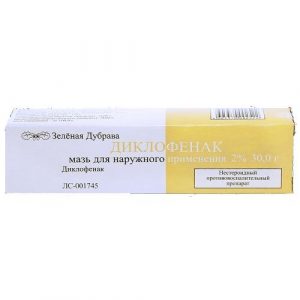Description
Release form
Dragee
Pharmacological action
A remedy for the treatment of gout.
ATX: Colchicine
Pharmacodynamics:
The anti-gout effect of colchicine is associated with a decrease in leukocyte migration to the focus of inflammation and inhibition of phagocytosis of microcrystals of uric acid salts. It also has an antimitotic effect, suppresses (in whole or in part) cell division in the anaphase and metaphase stages, and prevents neutrophil degranulation. Reducing the formation of amyloid fibrils, prevents the development of amyloidosis.
Highly effective for relieving acute gout. In the first 12 hours of therapy, the condition improves significantly in more than 75% of patients. In 80%, it can cause adverse reactions from the gastrointestinal tract before clinical improvement or at the same time.
In a daily dose of 1-2 mg when taken daily in 3/4 of patients with gout, the likelihood of developing repeated acute attacks decreases.
Prevents acute attacks in patients with familial Mediterranean fever (reduces the activity of dopamine-beta-hydroxylase).
Increases the life expectancy of patients with primary AL amyloidosis.
It has a positive effect on the skin (softening, reducing dryness) with systemic scleroderma.
Pharmacokinetics:
Colchicine is rapidly and intensively absorbed from the gastrointestinal tract. The average maximum plasma concentration is 4.2 ng / ml and is achieved approximately 70 minutes after a dose of 1 mg. The half-life is 9.3 hours. Colchicine quickly penetrates into tissues, has a high volume of distribution of 473 liters. High concentrations of colchicine are found in the liver, kidneys, spleen, white blood cells and gastrointestinal tract. Colchicine is metabolized in the liver and excreted mainly with bile.
Enterohepatic circulation is detected 4-6 hours after oral administration. Most of the administered dose is excreted through the intestines and about 23% through the kidneys.
Indications
Acute seizures of gout.
Prevention of acute gout attacks in combination with uricosuric agents.
Intermittent disease (familial Mediterranean fever).
To avoid complications, use only after consulting a doctor.
Use during pregnancy and lactation
Colchicum DispertВ® is contraindicated during pregnancy and lactation.
Special instructions
Treatment must be carried out under close hematological and clinical supervision.
If severe side effects from the gastrointestinal tract appear, the dose should be reduced or the drug should be discontinued.
With a decrease in the number of leukocytes below 3000 / μl and platelets below 100000 / μl, administration is stopped until the blood picture normalizes.
Impact on the ability to drive transp. Wed and fur .:
Not affected.
Composition
1 coated tablet contains:
Active ingredient: Colchicum autumn o seed extract [equiv. 500 mcg of colchicine] [in the extract 57-64% lactose, 28-32% microcrystalline cellulose] 15.6 mg
Excipients:
Kernel
Copovidone 5.33 mg
Corn starch 27, 5 mg
Lactose monohydrate 41.6-43.9 mg
Magnesium stearate 0.33 mg
Palmitostearic acid 1.34 mg
Talc 7.00 mg
Microcrystalline cellulose 3.6-5.2 mg
Shell sardlkp Acacia stone 0 , 3 mg
Carnauba wax 0.140 mg
Carmellose sodium 0.273 mg
Magnesium oxide 2.6 mg
Macrogol 6000 1.093 mg
Opalux AS 250,000
[sucrose – 0.7923 mg,
dye
Ponso 4R6 4R6 4R6 (6R) mg,
quinoline dye
yellow (E104) – 0.09652 mg,
titanium dioxide (E171) 0.07904 mg,
povidone 0.0133 mg] 1.2445 mg
povidone – K 25 2.186 mg
Sucrose 86.1515 mg
Talc 11,975 mg
Tit at dioxide (E171) 3.717 mg
Shellac 0.32 mg
Dosage and administration of
In an acute attack of gout, first take 2 sugar coated tablets (1 mg of colchicine), and then 1-3 tablets (0.5-1.5 mg of colchicine) every 1-2 hours until weakened pains. The total dose taken per day should not exceed 16 tablets (8 mg of colchicine). To prevent acute attacks of gout in the first few months of treatment with uricosuric agents, take 1-3 sugar coated tablets (0.5-1.5 mg of colchicine) daily or every other day, usually for 3 months.
Sugar-coated dragees are swallowed whole without chewing and drinking plenty of fluids.
Re-treatment of an acute attack of gout can be done no earlier than 3 days later.
Side effects of
Diarrhea, nausea, vomiting, and stomach pain may occur. Rare cases of leukopenia (a decrease in the number of white blood cells) have been reported. In some cases, after prolonged treatment, myoneuropathy (weakness of muscles and nerve tissues) was observed, less often – agranulocytosis, hypoplastic anemia (a change in the number of blood cells), skin changes and alopecia (baldness).
Drug Interactions
In combination with cyclosporine, especially in patients with impaired renal function, the likelihood of developing myopathy is increased.
Enhances the effect of depriving and sympathomimetic agents.
Disrupts the absorption of cyanocobalamin.
Nonsterotide anti-inflammatory drugs and other drugs that cause myelodepression increase the risk of developing leukopenia and thrombocytopenia.
Anti-gout activity is reduced by cytostatics (increase the concentration of uric acid) and urine acidifying drugs, alkalizing increase the effect.
Colchicum-Dispert® can be used in combination with allopurinol and uricosuric preparations.
Overdose
Acute intoxication was observed in adults after taking a dose of about 20 mg and in children after taking a dose of 5 mg.
Chronic intoxication may occur in patients with gout after taking a total dose of 10 mg or more for several days.
Since colchicine has antimitotic activity, organs with a high proliferation rate are more likely to be affected.
Storage Conditions
In a dry, dark place at room temperature.
Out of the reach of children.
Expiration
5 years.
active substance
Colchicum autumnale seed extract
Pharmacy Conditions
In retseptu
lekarstvennaja form
tablets
Haupt Farm Vûlʹfing GmbH, USA
